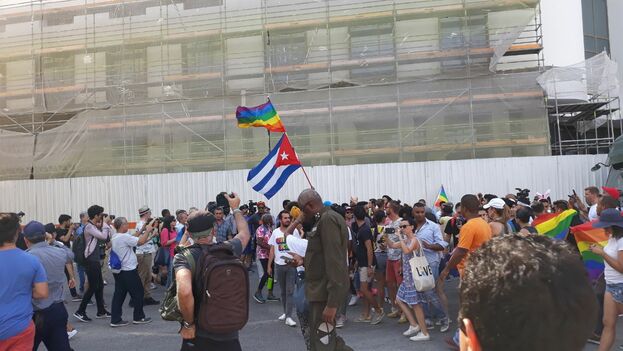
![]() 14ymedio, Yoani Sanchez, Havana | 12 May 2019 – If, on the eve of opening up internet access from mobile phones, Cuban officialdom had written a paper listing its five biggest fears about giving Cubans greater connectivity, those panic points would have been far below what has actually happened. In less than six months, we have experienced on this island a series of unprecedented events powered by social networks, events that defy the strict controls that have marked our society for too long.
14ymedio, Yoani Sanchez, Havana | 12 May 2019 – If, on the eve of opening up internet access from mobile phones, Cuban officialdom had written a paper listing its five biggest fears about giving Cubans greater connectivity, those panic points would have been far below what has actually happened. In less than six months, we have experienced on this island a series of unprecedented events powered by social networks, events that defy the strict controls that have marked our society for too long.
This Saturday, the call to an LGBTI march showed the strength of a call to action that is achieved in digital spaces. The regime, nervous and with the intention of demonstrating a show of force, did what it does best: suppress, which multiplied the reach of the event and left a trail of repudiation even among some of the pro-government supporters. The rejection of the police attack against this pilgrimage has been almost unanimous. The march was organized after the cancellation of the march traditionally carried out under the supervision of the National Center for Sex Education (CENESEX).
The march that was planned to go peacefully, was marred by a disproportionate police siege, with dozens of State Security agents dressed in civilian clothes and the arrest of at least seven participating activists. The repressors did not restrain themselves despite the extensive presence of foreign press and the many tourists who traditionally roam Havana’s Parque Central. For State Security, it was about sending a message: in social networks, yes, but in the streets, no.
Despite that “twentieth century mentality” of believing that what happens on the internet stays on the internet, those who follow Cuban politics and the performance of the police forces, saw that the police committed yesterday one of their worst mistakes in decades. There is no way to defend their actions from any angle, not even from evangelical groups that reject the LGBTI agenda, because in this case it is not only about sexual preferences or the demand for legalization of equal marriage. We are facing a violation of the right to gather and to demonstrate, something that concerns every citizen beyond the banner he or she defends.
In advance of the events in Central Park, social networks had already gained muscle. In less than two weeks they ruined the reputation of commander Guillermo García Frías, whom the Plaza of the Revolution has honored for more than half a century. Jokes quickly went viral about his unfortunate statements related to the “cultivation” (sic) of ostriches, jutias [giant rats] and crocodiles as food sources for the population, and the internet will not stop raining jokes and memes.
García does not have time to reverse the stigma now attached to him of “commander ostrich,” posted on Facebook and Twitter, nor will the most powerful official propaganda machine ever manage to clear his name. Nor can it erase the image of Miguel Díaz-Canel’s caravan accelerating in response to the demanding cries of the victims of the tornado in the Havana municipality of Regla, no matter how many times they publish in the national press a daily photo of the ruler surrounded by people. With one click, all the ideological scaffolding that elevated him to the presidency received a devastating blow.
Last week, the arrest of a reporter also served to show the ability of social networks to unite, in a campaign, different and very varied groups of civil society. From political opponents, to independent journalists, ordinary citizens and even to people who until then had not spoken a single criticism against the authorities in public, pressures for the release of 14ymedio reporter Luz Escobar, were assumed by a surprising diversity of individuals and organizations.
What will come next? Many more calls born in that virtual world that the political police have tried to distance from reality for more than a decade, since the first independent blogs were born and a handful of Cubans opened their accounts on Twitter and Facebook, then labeled in the official media as “tools created by the CIA.”
The time between the cases in which the internet users of this Island come together in a common initiative, launch a hashtag to demand something, and force the authorities to respond is getting shorter. Each day the time between the click that gives birth to a proposal and its materialization in our streets grows shorter. It also increasingly involves more people and more varied sectors of society. So, in the coming weeks, smartphones and police batons will face off again.
____________________
The 14ymedio team is committed to serious journalism that reflects the reality of deep Cuba. Thank you for joining us on this long road. We invite you to continue supporting us, but this time by becoming a member of 14ymedio. Together we can continue to transform journalism in Cuba.
